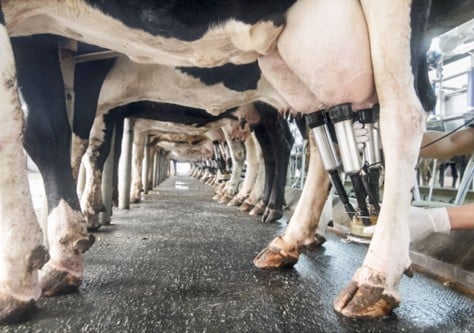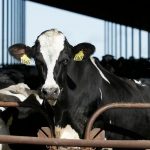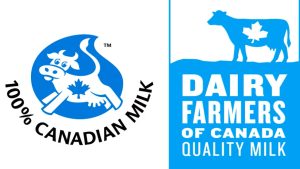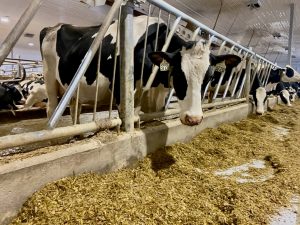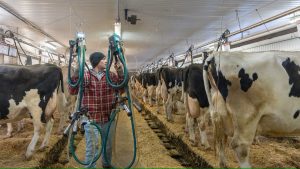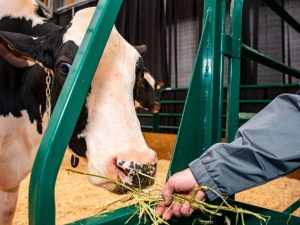
In the September issue of Progressive Dairy, Dairy Farmers of Canada (DFC) recounted how and why antimicrobial resistance is a global health risk. This threat to human and animal health was explained by experts on a panel at DFC’s 2024 Annual General Meeting.
The panel discussed how prudent antimicrobial stewardship and the reduction of on-farm antimicrobial usage – especially of products that are also important for human medical treatment – can have benefits both on farm and across human and animal health. But the conversation on antimicrobials doesn’t end there.
Despite these best practices, dairy farmers need help to continue their progress. At recent national and global meetings in September and November, DFC has ensured policy makers learned about the work dairy farmers are doing on antimicrobial usage and what help farmers will need to play their part within a “One Health” approach.
The fight against antimicrobial resistance is a global concern
In September, the United Nations (UN) hosted a high-level meeting on antimicrobial resistance in preparation of a joint declaration in September committing signatory countries (including Canada) to strive to meaningfully reduce the quantity of antimicrobials used globally in the agri-food system from current levels by 2030. DFC wrote to the ministers of health and agriculture outlining concerns regarding some of the commitments contained within the draft UN declaration. These concerns were largely addressed; while DFC is now satisfied with the declaration, it will continue to work with government officials to ensure that any Canadian commitments remain practical for dairy farmers.
DFC also joined fellow members of Animal Health Canada (AHC) in a campaign targeting key government officials as September’s declaration was being finalized. The campaign focused on highlighting farmers’ leadership and progress related to on-farm antimicrobial stewardship through prudent antimicrobial usage and strict biosecurity measures.
A central concept of the AHC campaign was farmers’ and veterinarians’ role in One Health, an integrated approach to infectious disease management stressing the interconnections between human, animal and environmental health. The reality is that due to various barriers, Canadian farmers’ access to veterinary products is eroding at a significant rate and has reached a crisis point. A lack of product variety means farmers and veterinarians must rely on an increasingly limited number of tools, some of which are also used in human medicine.
What’s being done in Canada
Lowering their reliance on antibiotics brings more localized benefits for farmers, too. Dr. Herman Barkema, professor in epidemiology of infectious diseases at the University of Calgary, shared data with farmers at the 2024 DFC annual general meeting showing how, when we reduce the use of antibiotics in animals, the resistance in humans goes down. He said that the number of infections among farmers and farmworkers also decreases by 29%.
These are some of the reasons why farmers have long worked in close collaboration with veterinarians on antimicrobial resistance monitoring and guidance. DFC partnered with the Canadian Dairy Network for Antimicrobial Stewardship and Resistance (CaDNetASR) to monitor and manage the issue in dairy farming. This initiative is part of the broader Canadian Integrated Program for Antimicrobial Resistance Surveillance (CIPARS). Since 2019, the program has involved visiting 144 dairy farms across five provinces annually to gather data on antimicrobial use from electronic and paper records. The proAction program, mandatory for all Canadian dairy farms, includes modules designed to ensure high standards in animal care and biosecurity that could reduce the use of key antibiotics.
Ahead of another UN event on the issue – World Antimicrobial Resistance Awareness Week, taking place from Nov. 18-24 – DFC worked to make sure policymakers also know what farmers still need from government to help them play their part.
DFC’s work on access to veterinary tools
Farmers and veterinarians recognize that, in order to best manage the health of their animals and play their parts within a One Health approach to reducing antimicrobial resistance, they must have access to the widest and most varied number of tools possible. It’s why the DFC team met with senators, members of Parliament and senior officials expressing the need for government to urgently address barriers and provide access to veterinary tools from all categories, including alternatives to antimicrobials.
As well as holding these in-person meetings, national organizations representing various animal farmers, veterinarians, veterinary product manufacturers and feed providers have been working for the past year on a joint white paper, which has recently been distributed to key federal officials. This document highlights consensus solutions to improve access to a wide variety of products for Canadian farmers and veterinarians.
If implemented, none of the proposed solutions will solve the problem on its own – however, each of the proposed solutions would increase Canadian access to critical veterinary tools. On top of all the progress farmers are making toward enhancing prudent antimicrobial stewardship and use, with adequate access to these important tools, Canadian farmers and veterinarians will be in a better position to play their part within a global One Health approach aimed at reducing antimicrobial resistance.
You can now read the most important #news on #eDairyNews #Whatsapp channels!!!
🇺🇸 eDairy News INGLÊS: https://whatsapp.com/channel/0029VaKsjzGDTkJyIN6hcP1K
